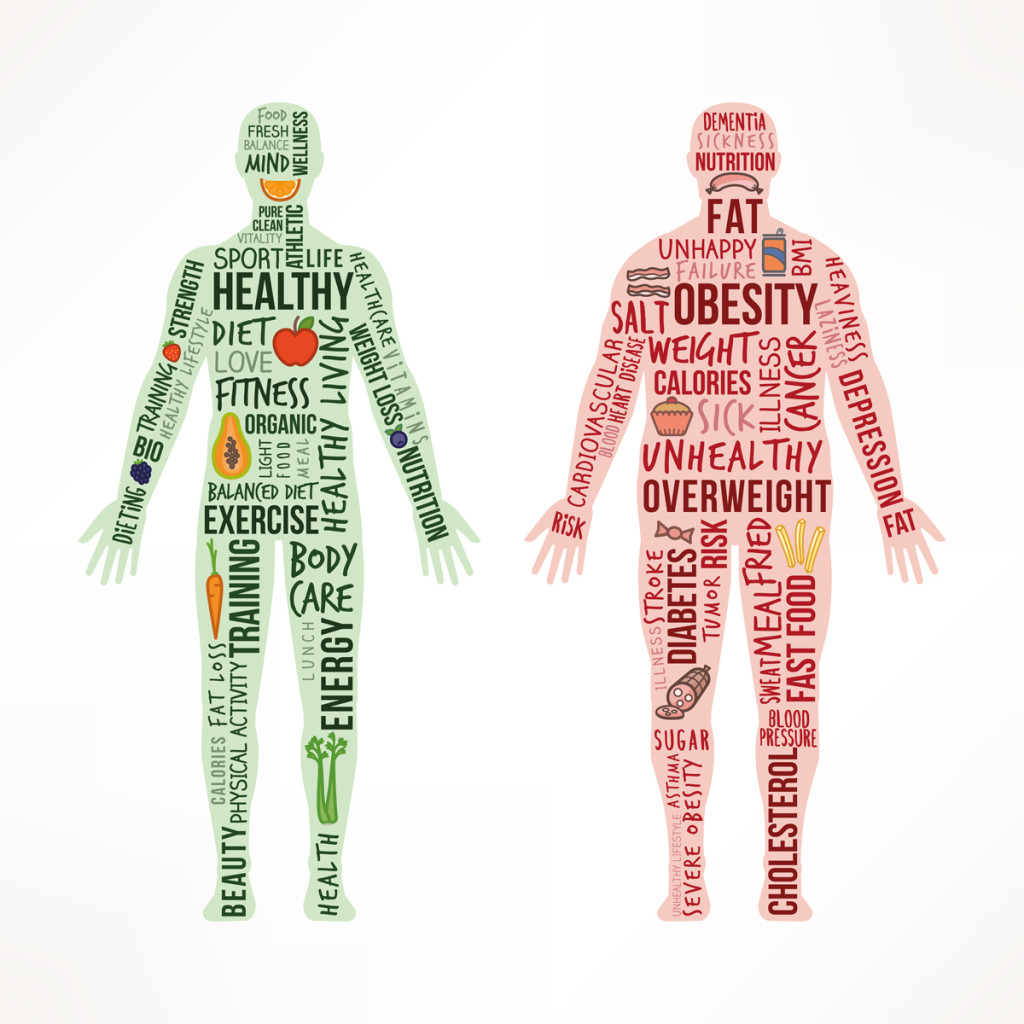A healthy diet is one which contains a variety of nutritious foods including carbohydrates, proteins, fats, vitamins, minerals, fiber and water. Poor eating habits include under or over eating, leading to nutritional deficiencies that can have negative consequences on the body.
 Short term effects of poor nutrition include stress, tiredness, decreased capacity to perform tasks, and overtime can contribute to the risk of developing illnesses and other health problems such as:
Short term effects of poor nutrition include stress, tiredness, decreased capacity to perform tasks, and overtime can contribute to the risk of developing illnesses and other health problems such as:
- Being overweight or obese
- High blood pressure
- High cholesterol
- Heart disease and stroke
- Type-2 diabetes
- Osteoporosis
- Depression
- Eating disorders
- Tooth decay
An unhealthy diet is a major risk factor for obesity and creates a plethora of health problems that plague today’s society. With the increase in the availability of processed, convenience and fast foods, obesity is on the rise. Obesity exerts stress on every part of the body increasing the risk of developing chronic health conditions, infertility and sleep apnea.
Obesity is the leading cause of heart disease and Type 2 diabetes. Eating a lot of refined grains and processed foods high in sugar content cause the glucose levels to spike and drop repeatedly. Over time, these dramatic changes in blood sugar levels can lead to insulin resistance, characterized by decreased sensitivity to insulin. If ignored, this can lead to Type 2 diabetes.
Unhealthy foods are usually high in sugar, salt, fat and cholesterol. Eating such foods on a regular basis can lead to increase in blood pressure as well as cholesterol and triglyceride levels. This can cause a great deal of stress on the heart, increasing the incidence of heart attacks, stroke and cardiovascular disease.
The brain relies on glucose for energy which it derives from carbohydrates and other nutrients such as healthy fats and antioxidants to function properly. Eating fatty foods has a negative impact on brain function that results in decreased cognitive abilities, poor memory and concentration abilities.
Eating too much or too little can lead to lethargy, fatigue and other effects that hinder physical activity. According to the National Eating Disorders Association, obese people have poor muscle strength and stamina. Consuming too few calories can temporarily lead to weight gain. Restrictive diets put you on starvation mode which slows down metabolism-particularly if you are on a ‘on and off’ again diet.
Overeating, eating too fast, or eating too greasy or fatty foods and drinking too much alcohol or coffee can cause heartburn and indigestion. This may be accompanied with nausea, bloating and acid reflux. An unhealthy diet that includes fatty and spicy foods if consumed at night can cause flare-ups, disturbing your sleep pattern. Over time, lack of sleep can lead to anxiety, depression and reduced brain capability.
 The chemicals in the brain that promote positive moods known as serotonin and dopamine, rely on proper nutrition. Unhealthy eating habits can cause feelings of shame, depression, guilt and interfere with blood glucose levels which can disrupt positive moods.
The chemicals in the brain that promote positive moods known as serotonin and dopamine, rely on proper nutrition. Unhealthy eating habits can cause feelings of shame, depression, guilt and interfere with blood glucose levels which can disrupt positive moods.
Many Americans are overfed but under-nourished. This means that the kind of foods they eat i.e. convenience and packaged foods, have been stripped of nutrients, hence are nutritionally deficient as most essential vitamins and minerals are found in fresh fruits, vegetables and lean meats.
The way that the norms of our society and our eating habits are changing, the mortality rates are set to decline even further at a rapid pace. If you and your family wish to lead a life that is long and healthy then you will definitely have to reconsider your eating habits and make drastic lifestyle changes in order to not become another statistic.
Zyana Morris is a passionate blogger who loves to write on trending health, fitness and lifestyle topics. She is a featured author at Healthable, Uplifting Families, Inscriber Mag, Hello Mamas and few others. Her favorite quote “It does not matter how slowly you go as long as you do not stop”. You can follow her through Facebook and Twitter.

